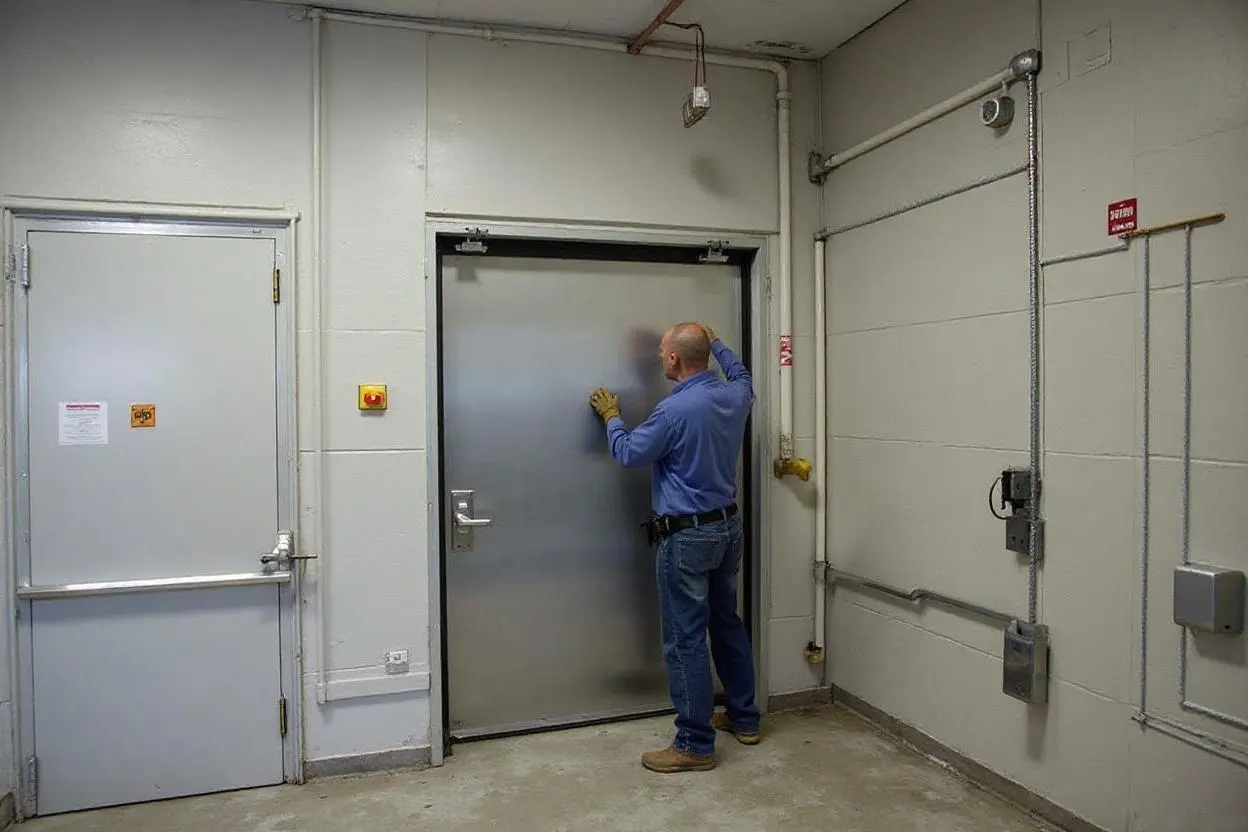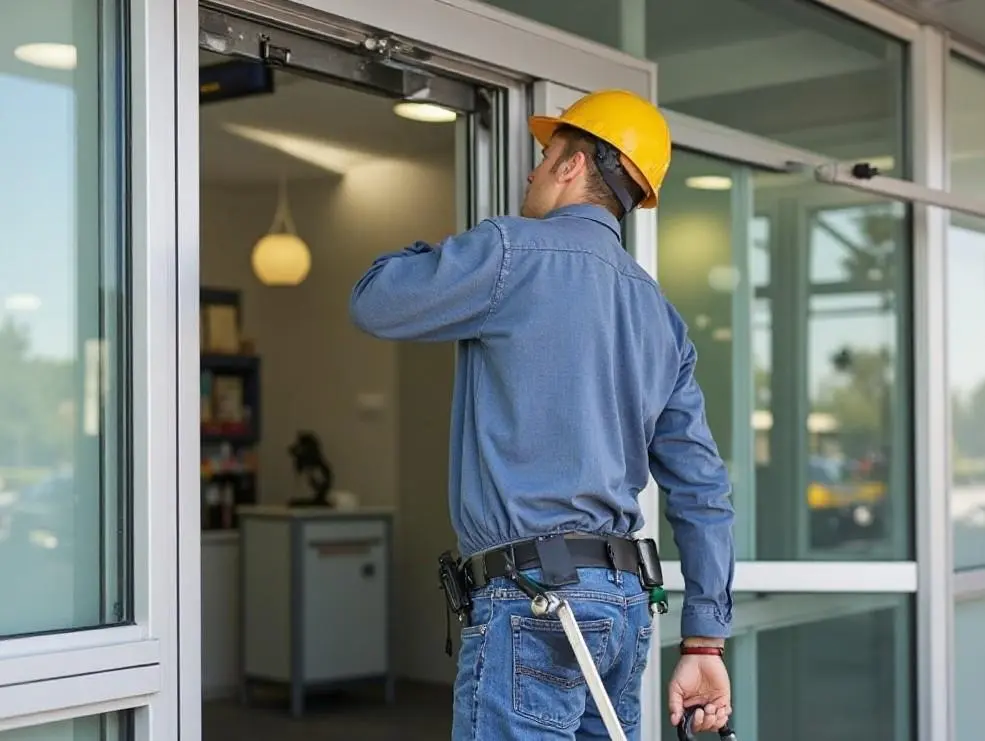Sliding doors take a beating in Buffalo. Lake-effect snow, gritty spring thaw, and humid summers push rollers, tracks, and seals harder than most homeowners expect. When a door starts sticking, grinding, or gapping, it signals more than annoyance. It points to worn rollers, bent tracks, swollen frames, or hidden water damage that can spread into subfloors and drywall. Addressing issues early costs less than a full panel replacement and restores smooth, quiet operation.
This guide explains the most common problems with residential sliders in Buffalo, what can be fixed on-site, and when a panel or frame should be replaced. It reflects hundreds of local service calls across North Buffalo, Elmwood Village, Allentown, South Buffalo, Cheektowaga, West Seneca, Tonawanda, Amherst, and Hamburg. For urgent needs, A-24 Hour Door National Inc. offers same-day sliding door repair Buffalo homeowners rely on in any season.
Why sliding doors fail in Western New York weather
Buffalo’s freeze-thaw cycle expands and contracts aluminum and vinyl frames. Tracks accumulate mineral grit from road salt and sand, which chews up nylon rollers. Summer humidity swells wood and composite jambs, then winter dries them back, loosening screws and changing the reveal. Wind-driven rain forces moisture under thresholds where it rots shims and subfloor edges. These forces show up as heavier rolling, latch misalignment, drafts along the stile, and hairline cracks in glass or cladding.
A well-installed slider should run with one-hand pressure and latch without lifting the panel. If a homeowner needs to tug, the system is out of adjustment or worn.
Sticking doors: dirt, flat rollers, or a bent track
Sticking is the top complaint in sliding door repair Buffalo searches, and for good reason. Grit in the lower track builds a ridge that acts like a speed bump. Rollers flatten over time or seize when bearings corrode. A minor bend from a past impact creates a cam that stops the panel at the same spot every time.
A proper service call starts with removing the active panel, vacuuming and degreasing the sill, and inspecting the track under good light. If the track has a small dent, a technician can dress it with a forming anvil made for door sills. Deep gouges may need a stainless track cap that bonds over the damaged rail. Rollers get replaced in pairs using manufacturer-matched units. After reinstallation, the technician sets height and plumb to center the panel in the frame and confirms the latch meets the keeper cleanly.
Homeowners often spray silicone into a dirty track. That makes a gritty paste that wears the rollers faster. Dry cleaning first, then a light dry-film lubricant, keeps dust from sticking.
Cracks: glass, cladding, or frame stress
Broken or cracked glass needs fast attention. Tempered safety glass usually shatters into pebbles, but a sealed insulating unit can also show a corner crack from impact or stress. If the crack is inside the sealed unit and the door still operates, replacement glass can be ordered by visible daylight size and spacer thickness. Typical lead time runs 5 to 10 business days in Buffalo, faster for common sizes. If the door is flagged as a security risk, temporary board-up protects the opening until the new unit arrives.
Hairline cracks along vinyl cladding or at screw bosses signal frame stress from heaving subfloors or mis-set rollers. The fix is often structural: reset rollers to remove weight from a corner, shim the sill, or correct a twisted frame. Filling a cosmetic crack without relieving the stress will not hold through a Buffalo winter.
Misalignment: latching issues and air leaks
A misaligned slider may still move, but it fails where it matters: it will not latch without lifting, the weatherstrip does not contact the jamb evenly, or daylight shows along the interlock. Common causes include roller height out of balance, sag at the header from an undersized lintel, or a keeper plate that drifted after screw holes elongated.
A careful tech checks reveal top to bottom. If the gaps taper, roller adjustment can usually correct it. If gaps remain even after roller tuning, the frame may be racked. Adjusting the keeper plate offers minor relief, but a racked frame points to settling or a compromised sill. In older homes in the Elmwood and Allentown areas, deep-set sliders sometimes sit on old, softened subfloors. Injecting a structural foam under the sill or sistering new blocking from the basement can bring the frame back into square.
Hardware that works in Buffalo conditions
Not all rollers and locks are equal. Cheaper nylon rollers with open bearings fail early under grit and cold. Sealed stainless or precision steel bearings last longer in Buffalo’s mix of salt and moisture. Multi-point locks resist prying and keep interlocks sealed in high wind. For coastal-grade performance on the lakefront, stainless fasteners and a stainless track cap pay for themselves in fewer callbacks.
A-24 Hour Door National Inc. stocks common roller kits and locksets for major brands found in Buffalo homes, including Pella, Andersen, Atrium, and common builder-grade units. For discontinued models, a retrofit roller with adjustable height and proper axle offset often brings a tired door back to life without a full panel swap.
Water intrusion and soft thresholds
Water at the interior edge of the sill is more than a nuisance. Over time it rots subflooring and swells the jamb, which throws off alignment. Typical entry points include clogged weep holes, a sloped-in sunroom slab, or a deck that sits flush with the sill and dumps water against the frame.
A service visit includes flushing and clearing weeps, resealing end dams, and checking sill pitch with a digital level. If the deck traps water, the best fix is a small, hidden channel cut to relieve the puddle. In heavy weather exposure, adding a low-profile sill pan or drip edge reduces infiltration. Homes in South Buffalo with wind-driven snow benefit from a deeper interlock brush and a fresh bulb seal along the jamb.

Repair or replace: honest thresholds for decision-making
Not every door needs replacement. In many Buffalo homes, a full rebuild restores a 10- to 20-year-old slider to near-new function at a fraction of replacement cost. Choose repair when rollers are worn, tracks are dented but continuous, locks are sloppy, or seals have aged. Parts and labor often run a few hundred dollars depending on glass size and access.
Consider replacement if the frame is racked beyond shim correction, the sill is rotten through, insulated glass has widespread seal failure with moisture between panes, or the panel skin is delaminating. If energy bills are a priority, upgrading from a single-pane or early dual-pane to a modern low-e, argon-filled unit with better U-values can cut heat loss, especially on west-facing exposures in Amherst and Tonawanda.
What a professional service appointment looks like
A credible sliding door repair Buffalo homeowners can trust follows a clear sequence: listen to the symptoms, inspect without rushing, explain options with costs before turning a screw, and test the result with the client. Average on-site time for rollers, track dress, and alignment runs 60 to 120 minutes for a standard 6-foot door. Add time for glass board-up or keeper rework. Jobs in tight townhouses or third-floor walk-ups need extra planning for panel removal and safe handling.
Quick homeowner checks before booking
A few small checks can rule out simple causes and help describe the issue on the call:
- Vacuum the lower track and clear weep holes with a plastic straw, then test the door again. Look at the gap along the top. If it tapers, mention which side is tighter. Try the latch without lifting the panel. Note if the hook meets the keeper or rides under it. Watch the rollers while moving the door. If it bumps at the same spot, note where on the track. Shine a flashlight at night around the interlock to spot air gaps or wet spots after rain.
Sharing these notes helps the dispatcher send the right parts on the first trip.
Safety and glass handling
Tempered glass is heavy. A standard 72 by 80-inch IGU can weigh 75 to 120 pounds depending on thickness. Removing panels without proper suction cups and stands risks injury and damage. Homeowners should avoid prying a door out to “clean the wheels.” If glass cracks, tape both sides with clear packing tape to stabilize it and keep children and pets away until a tech arrives.

What A-24 Hour Door National Inc. does differently
Local knowledge matter in sliding door repair Buffalo searches. Technicians see the same failure patterns by neighborhood and builder, so they arrive ready. The team carries track caps, sealed rollers, multi-point lock retrofit kits, weatherstrip profiles for common frames, and hardware in stainless for lake exposure. They document reveals and sill pitch before and after work, so the fix is measurable. They also give straight advice on repair versus replacement with realistic lead times for glass.
Many calls come after hours. Doors that will not lock or glass that has shattered cannot wait. Dispatchers answer 24/7 and can board up or secure the opening the same day in Buffalo, Cheektowaga, West Seneca, and nearby suburbs. Weekend service is available during storm events when sliders take the brunt of drifting snow and ice.
Pricing signals and warranty
Most roller and track refurbishments price within a predictable range once make, size, access, and condition are known. Glass replacements vary with type and supplier lead times. A-24 Hour Door National Inc. provides written estimates on-site and backs labor with a clear warranty. Manufacturer warranties apply to parts and insulated glass units based on supplier terms. The company explains what is covered and for how long, in plain language.
Ready to get your slider moving again
If the door sticks, grinds, or will not latch, waiting rarely makes it cheaper. A precise adjustment and the right hardware can restore smooth glide and a tight seal, even in Buffalo’s hard weather. For fast, local service, contact A-24 Hour Door National Inc. Call to schedule sliding door repair in Buffalo or request a same-day visit for security issues. Describe the symptoms, share a photo of the track and latch, and the team will arrive A-24 Hour Door National Inc: automatic sliding doors repair Buffalo prepared to fix it right.
A-24 Hour Door National Inc provides commercial and residential door repair in Buffalo, NY. Our technicians service and replace a wide range of entry systems, including automatic business doors, hollow metal frames, storefront entrances, fire-rated steel and wood doors, and both sectional and rolling steel garage doors. We’re available 24/7, including holidays, to deliver emergency repairs and keep your property secure. Our service trucks arrive fully stocked with hardware, tools, and replacement parts to minimize downtime and restore safe, reliable access. Whether you need a new door installed or fast repair to get your business back up and running, our team is ready to help.
A-24 Hour Door National Inc
344 Sycamore St
Buffalo,
NY
14204,
USA
Phone: (716) 894-2000
Website: https://a24hour.biz/buffalo
Instagram: @a24hourdoor
Facebook: 24 Hour Door
Yelp: A-24 Hour Door National (Buffalo)
X (Twitter): @a24hrdoor